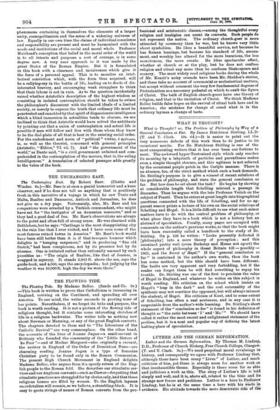WHAT IS THOUGHT?
What is Thought? or, The Problem of Philosophy by Way of a General Conclusion so Far. By James Hutchison Stirling. LL.D.
(T. and T. Clark. 10s. 6d.)—It is easier to point out the very numerous defects of this work than to do justice to its occasional merits. For Dr. Hutchison Stirling is one of the most exasperating writers that it has ever been our fortune to meet. The awkward hyper-Teutonised style which only reaches its meaning by a labyrinth of particles and parentheses makes even a simple thought obscure, and this ugliness is not relieved by the occasional purple patch in the Carlyle manner. There is an absence, too, of the strict method which such a book demands. Dr. Stirling's purpose is to give a resume of recent solutions of the problem of philosophy, and, state the general conclusion so far. But how does he set about the task ? He begins by showing at considerable length that Schelling misread a passage in Descartes. Then he argues with the late Professor Veitch on the subject of Prantl. Then he enters at great length into biographical questions connected with the life of Schelling, and for no ap- parent reason prints a lecture of his own on the social relations of Schelling and Hegel. It is a little difficult to see what such minor matters have to do with the central problem of philosophy, or what place they have in a book which is not a history but an abstract of speculation. Finally, many pages are occupied with comments on the author's previous works, so that the book might have been reasonably called a handbook to the study of Dr. Stirling. On p. 102 he writes : "Locke presently deflected it [philosophy] into a mere theory of perception ; and this remained pretty well (even Berkeley and Hume not apart) the whole aspect of philosophy in Great Britain till — possibly — 1865, and the Secret of Hegel." If the "general conclusion so far" is contained in the author's own works, then the book has some method, but the title should have been different. The faults are very apparent and very forbidding, but if the reader can forget them he will find something to repay his trouble. Dr. Stirling was one of the first to proclaim the value of Hegel in England, and whatever he writes on this subject is worth reading. His criticism on the school which insists on Ilegel's "leap in the dark" and the real externality of the synthesis may not convince the opponent, but will always interest the student, of Hegel. His criticism of Kant, and to some extent of Schelling, has often a real acuteness, and in any case it is respectable from the author's wide learning. Dr. Stirling's short statement of the "conclusion so far" is found in his definition of thought as "the ratio between 'I' and 'Me." We should have called it rather the most recent and enlightened statement of the problem, but it is a neat and popular way of defining the latest halting-place of speculation.


















































 Previous page
Previous page